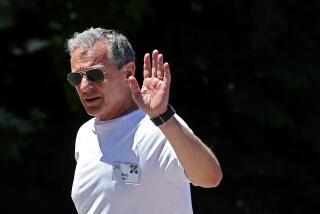Gerstner Expected to Take Reins at IBM : Computers: The RJR Nabisco chairman is an industry outsider with no technology background. He would replace Akers as CEO of the beleaguered firm.
- Share via
International Business Machines Corp., gambling that an outsider with no computer industry experience can pull it out of an ever-deepening crisis, is expected to name Louis V. Gerstner Jr., chairman of RJR Nabisco Holdings, as its new chief executive, perhaps as early as today or Friday.
Speculation has intensified for the past week that IBM’s widely watched executive search--launched in January when chairman and chief executive John Akers announced he would step aside--was zeroing in on Gerstner, and the Wall Street Journal reported Wednesday that his appointment was imminent.
IBM and RJR declined to comment on the report, but sources close to IBM confirmed that Gerstner was the likely choice. Wall Street, apparently wary of someone who lacks a technology background and spooked by new signs of weakness in mainframe computer sales, sent IBM shares down $3.125, to $51.125.
Gerstner, 51, is generally given high marks for his performance at RJR, where he took over following the largest leveraged buyout in history and deftly pared down a huge debt load. He is also a former president of American Express, which has one of the most sophisticated computer operations in corporate America.
But the task facing him at IBM would dwarf his previous challenges. The company’s core mainframe computer business is shrinking rapidly as customers move to cheaper personal computers and workstations. And IBM’s rigid, bureaucratic culture, once held out as a model of managerial efficiency, has rendered the company incapable of responding to rapid technological change.
IBM has lost nearly $8 billion and shed 100,000 jobs over the last two years, and no turnaround is in sight. Akers’ efforts to address the problems by breaking the company into semi-independent operating units have had little effect so far. In January, under intense pressure from institutional investors and the media, he announced he would step down as chief executive.
Although most analysts support the selection of an outsider as the new CEO, they are sharply divided on the wisdom of naming someone such as Gerstner who has no background in technology.
“It’s an interesting appointment,” said Charles Morris, co-author of a new book about the computer industry and an early critic of Akers. “The company has to be run in a more decentralized fashion, with decisions closer to the market, so a technologically humble CEO might not be such a bad thing.”
He emphasized that a new team of top managers would have to be brought in along with the CEO, so there would be plenty of room for new technological expertise at the top.
Mark Stahlman of New Media Associates, a respected IBM-watcher who has called for a radical restructuring of the company, called Gerstner “an excellent choice” whose lack of industry experience would enable him to be an impartial arbiter of IBM’s many different businesses.
But others said it would be a huge mistake to bring in someone who didn’t already understand the enormously complex computer industry.
“It’s going to take him six months or a year to understand what the issues are, and IBM has already wasted five years,” said Stewart Alsop, editor of the trade newspaper Infoworld. “Smart management is not their problem. Technical vision is their problem.”
But the IBM board of directors’ search committee, led by former Johnson & Johnson Chairman James E. Burke, apparently had trouble finding someone who could be both cost-cutter and technical guru. Motorola Chairman George Fisher, former Hewlett-Packard Chief Executive John Young, Apple Chairman John Sculley and several other prominent high-tech executives stated publicly that they didn’t want the job.
Indeed, for executives accustomed to running successful growth companies, the IBM job might not look very appealing. Most analysts believe another 75,000 to 100,000 jobs will have to be cut, and many divisions may be sold or shut down.
Sculley’s success at Apple, which he joined following a marketing career at Pepsico, was cited by some as an example of a non-technologist doing well at a high-tech company. But Alsop noted that Sculley came in when Apple was a successful company in transition, not when it was in the midst of a free-fall.
Several sources said Gerstner would likely be named in tandem with an insider and technologist who would get the job of president and chief operating officer. Jim Cannavino, head of the personal systems division, was cited as the leading candidate for that post.






